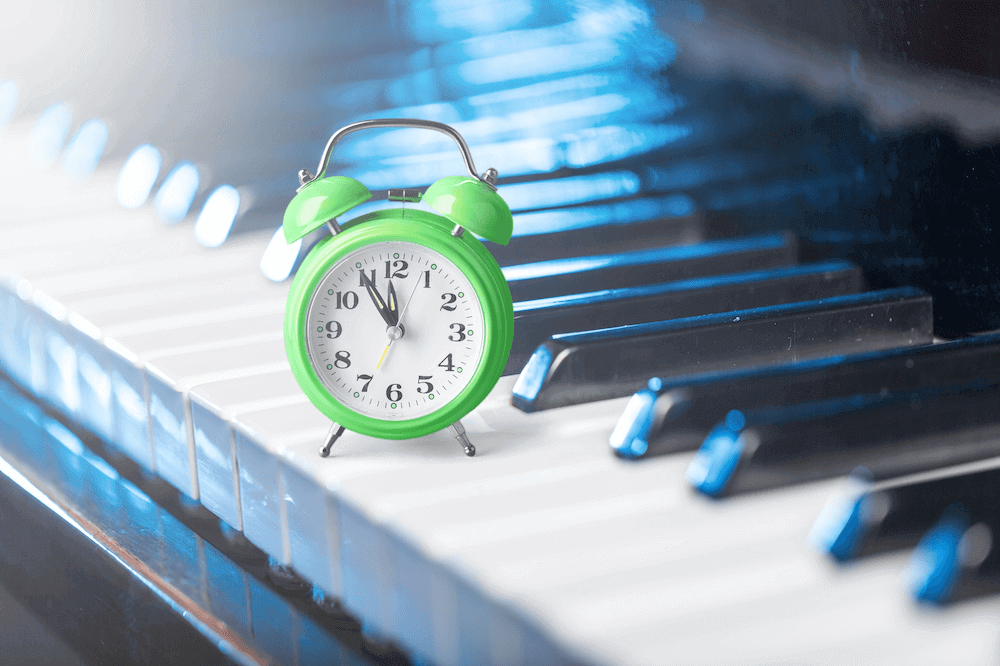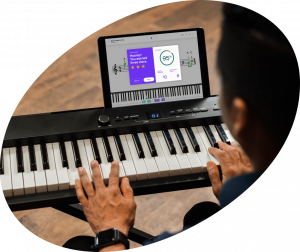Learning the piano can be a challenge at times, but there are many things you can do to help you overcome any challenge and stay motivated.
Playing the piano involves several things going on at the same time including: playing with both hands, having hand independence, using the foot pedal, performing with expression, and of course, playing the correct notes at the correct time. All of these things happening at once, sure, at times can be a challenge, but the beauty of the instrument makes it all worth it.
It is a journey for pianists at all levels to achieve their ideal sound and proficiency on the instrument. This journey takes time and patience. It is easy for one to feel stuck or demotivated when they reach a challenging piece or piano concept.
This article will provide you with tips and tricks on how to stay motivated and inspired to overcome any challenge that you may face when playing the piano.
Piano location
The location of your instrument can help keep you motivated. Try to set up your keyboard or piano in a prominent part of your living space if possible. This could be a bedroom, or a living room. If your instrument is set up in an accessible space, you will be compelled to sit down and play more frequently.
You will find yourself playing for short periods of time throughout the day. These short moments of spontaneous practice will keep your playing sharp and your musical mind stimulated. This will allow for more moments of inspiration and discovery. In the process of learning an instrument, it is important to be able to play when one feels the impulse.
Warm-up routine
It is important to develop a consistent warm-up routine before you sit down to play for an extended practice session. The warm-up routine should be a piece or exercise you know and can play easily and with confidence. This will warm your fingers up and bolster your confidence in your playing. With warmed fingers, and strong confidence, you will be able to tackle what you are trying to accomplish more efficiently, as your mind and body will be in-tune with each other.
Take breaks
Playing piano is as much a physical activity as it is a mental activity. You want to try to be cognisant of both your physical and mental state while practicing. If your hands and fingers feel tired, you want to listen to your body. Take breaks. Stretch. Drink water. Take deep breaths. If you find yourself getting frustrated, it is good to do the same.
The best way to accomplish something on the piano is to make sure your mind and body are comfortable. Taking a break during intense practice sessions will ease the tension in your body, and the frustrations of your mind! A short break from your practice will keep you feeling fresh and motivated as you work through a piece of music or new technique.
Don’t ignore your mistakes
Making mistakes is an integral part of learning piano. They happen while learning any piece of music, technique or exercise. When you make a mistake, take a moment to recognize it. If you make the same mistake more than once, it is important to internalize what it is.
Take the time to slow things down and work it out. If you do not do this, the mistake can become a hard-to-break habit! It is important to correct the mistake, or make your best effort at correcting it. If a mistake becomes a habit while playing a piece, you can find yourself frustrated and unmotivated.
Dissect and analyze the music
When you decide to learn new songs on piano, it is great to understand the reason why you are learning it: are you learning it because it is a song you love, or are you learning because of a technical or piano educational benefit?
Once that answer is clear to you, listen to what you are learning, with that in mind. Think about the moments of the song that might be the most difficult. Internalize that and analyze it. Mentally prepare yourself by listening to and reading it before you begin playing.
Learn in segments and increments
When you sit down to learn a piece of music, you want to try to learn it in chunks and segments. It is wise to not always start at the beginning of a piece. Locate a section of the music that might be most challenging. Start there, it will make the rest of the piece easier to learn.
When you pick out any segment of a piece to begin playing, you want to try to accomplish something. Try to be able to play a measure or two cleanly. Each measure learned is an accomplishment, or a win. If you take this approach, you will stay motivated throughout the learning process. Feeling that you have accomplished something will keep you inspired, and should provide the ultimate push you need to learn a piece.
Stay motivated and keep practicing
What’s most important is that you enjoy the process of learning to play. Coming up against some challenges is all part of the journey. Sometimes purposefully choosing a new challenge to help bring you out of your comfort zone may be exactly what you need to push forward. Remember, challenges aren’t a bad thing. With a little determination and dedication, you can overcome any challenge!

